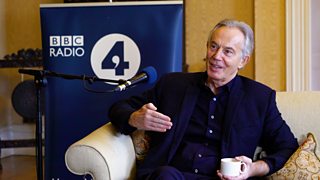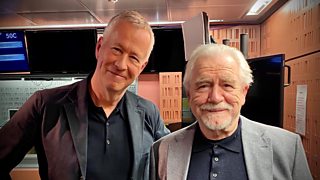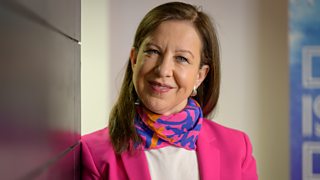10 things we learned when the Archbishop of Canterbury met Clare Moriarty
In a new series for Radio 4 the Archbishop of Canterbury, Justin Welby, has deep conversations with people who have made a significant contribution to public life, about what they believe. How have they navigated their inner life alongside their public profile? What has been their moral “touchstone” through the good times and the bad? How do they engage with faith and spirituality?
Justin meets the chief executive of Citizens Advice, Dame Clare Moriarty. Before taking up her current role last year, she had a distinguished 35-year career in the civil service. Her last government job was as permanent secretary to the Department for Exiting the European Union. In 2017, she became a "faith and belief champion" in the civil service, saying, “of all the diversity characteristics, faith and belief is the one we talk about least”.
1. As a girl, she fought to become the first female server in her church
“I grew up in a household of faith,” says Clare. “Faith was part of my life… but it brought with it all sorts of interesting questions.” Her family went to a very beautiful Anglo-Catholic church with a very strong tradition of ritual, which was “all male”; all the servers who carried the candles, bells, and thuribles with burning incense were boys. “One of the early battles that I fought was to be allowed to join this group of people,” she recalls.
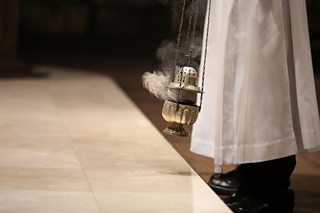
“They eventually let me be a server on the basis that I had short hair and we wore cassocks and surplices, and the distance between the pews and the high altar in this very long church was sufficient that people would not be able to see that I wasn’t a boy,” she says.
In the end, the congregation cottoned on, she says, but they’d “become accustomed to the idea that the sky wasn’t going to fall in if a girl carried a candle and a cross.”
2. She comes from a long line of “campaigning feminists”
Clare’s personal crusade, which she began at the age of just ten, took place in the context of the broader debate about the ordination of women. “My mother was very much part of the movement for the ordination of women,” says Clare. “And I come from many generations of campaigning feminists. Her earliest experience of the Church was as “the place where feminism and the actual experience of discrimination was being played out”.
3. She developed techniques to cope with the uncertainty of Brexit
As permanent secretary to the Department for Exiting the European Union, Clare had to cope with tremendous uncertainty. “It was a very, very difficult time,” she admits. “I thought I’d got pretty good at managing extreme uncertainty, but it went up a level when we were worrying about what would happen if we left the European Union without a deal.”
“I’d developed all sorts of techniques,” she says. “I put a virtual reality headset on my entire department to say, within this headset, let’s assume that we’re definitely leaving without a deal and now let’s do everything that we would do if we knew that for certain. And then in three months’ time we’ll lift it up and see what the landscape looks like.”
Another of her analogies involved Lego bricks. “I said, OK, we’re just going to make some Lego bricks and we don’t know yet whether we’ll be asked to build a yellow submarine or a pink fairy castle but if we’ve made Lego bricks then we can put them together. Even if they form only a multicoloured foundation for something that we can’t see at the moment, we’ll have stuff that we can draw on.”

4. Clare and her mother were diagnosed with cancer on the same day
In the same year that she was dealing with the uncontrollability of Brexit, Clare’s mother was diagnosed with lung cancer and she was diagnosed with breast cancer. “We both received our final diagnoses on the same day,” says Clare. “I went in the morning to one hospital and got my diagnosis and in the afternoon with my mother to another hospital to get her diagnosis.”

One of the campaigns I used to run in the civil service was against people saying women should be more confident...Dame Clare Moriarty
“I don’t think I had a supplementary coping strategy,” she says. “I think I have quite a high capacity to put one foot in front of the other.” She would ask herself: “Is there something I can do that’s practical that will make me feel better and bank something for the future so that when I look back on this time, I have got something from it?”
5. She believes we do our best work when we are allowed to be our whole self
When Clare was weighing up the benefits of a faith and belief champion within the civil service, there were two things which felt really important.
One of them was faith literacy. “Understanding the complexity of faith around the country and the way in which people’s religious beliefs intersect with their social and cultural beliefs… If the civil service does not understand that, both as a maker of policy and as a deliverer of services, then it’s never going to be the best that it can,” she argues.
The other was inclusion, and people being able to bring their whole self to work. “Historically, because the civil service is a very analytic institution, people had felt that they were being asked to leave their personalities at the door and come into the workplace as objective, decision-making machines.” Actually, we don’t do our best work if we’re burning up energy keeping compartments watertight, says Clare. “We do our best work when we feel that we are valued for being the whole person that we are. And for people of faith, our faith and belief is part of what shapes us.”
6. She hates people saying women should be more confident
“One of the campaigns I used to run in the civil service was against people saying women should be more confident,” says Clare. “Actually, 'women need to be more confident' doesn’t mean 'women need to be more confident'; it means 'confident women need to look more like confident men because then we’ll know that they’re confident.'” We see things through a particular lens, she argues, and that’s where the difficulty lies: “Seeing the invisible in order then to start tackling it because we’re so conditioned.”
7. She struggles with “faith imposter syndrome”
“I am not that comfortable talking about faith. I struggle with what I call faith imposter syndrome,” says Clare. She constantly feels like somebody might come along and say her faith isn’t really good enough because she doesn’t talk about it properly. “When I was at school the Christian Union did pray for me because I hadn’t seen the light, because there is no moment that I can point to when I say this was the moment at which God was revealed or my faith started, because it’s always been there. And I really struggle to say this is something that I do because of my faith.”
But her work has helped her. “I think the faith and belief role did push me, like everybody else, to get over this huge hump of discomfort about talking about faith and belief.”

8. The values that are important to her are fairness, justice, respect and humility
The Archbishop asks Clare, who does she follow, in faith terms? “I could say I follow Christ,” she says, but “just articulating those words, they feel like they belong to a slightly different tradition. I tend to come back to, what are the values that are very important to me?
“The things that are really important to me are fairness and justice and respect and humility,” she says. You find them in Christ “but it’s quite difficult to say, well, these are values that are specifically Christian.”
9. As a civil servant, using her moral compass was crucial
“There’s a paradox at the heart of the civil service code,” says Clare. “On the one hand you must give your best advice and then, you must implement whatever the government decides to do, whether or not it is in line with the advice that you gave.”
You have a value of loyalty to the government and, at the same time, values of care for the people you’re leading. “Quite a lot of the time you’re dealing with values pulling in different directions,” she says.
“One of the lightbulb moments for me, in my civil service career, was realising that the discomfort that comes from having to get out your moral compass and apply it is actually not compromise. What it tells me is that my values are engaged.”
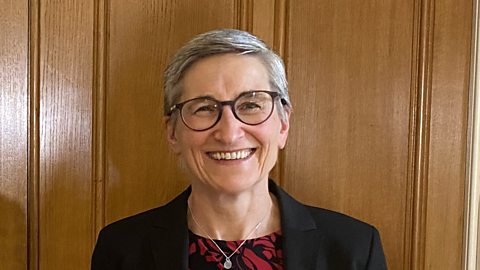
What if you're asked to do something legal but wrong?
If all else fails, says Clare Moriarty, you have to press the nuclear button...
10. Working for Citizens Advice feels like “coming home”
Clare has taken the helm at Citizens Advice during a period of, what the Archbishop describes as, “intense, appalling poverty”. How do her values inform how she acts in the role?
“We try and help people downstream when they’re experiencing problems and we take their experiences, turn experience into data, into insights, and try and do policy influencing in order to act upstream – and stop them falling into the river in the first place,” says Clare.
“For me it does kind of feel quite like coming home. It’s a mission and a purpose that I feel really passionate about.” She believes her personal values lead her to ask, “What can I do? How can I use my position, my influence, my opportunities to be able to make a case in a way that has the best possible chance of landing, in order to try and make a difference?”
-
![]()
Listen to The Archbishop Interviews Clare Moriarty
This week's guest is the Chief Executive of Citizens Advice Dame Clare Moriarty. Before taking up her current role last year, she had a distinguished 35-year career in the civil service.

More deep conversations on Radio 4
-
![]()
The Archbishop Interviews... Tony Blair
The former PM reveals that the values and principles of his faith underpinned his career.
-
![]()
This Cultural Life: Brian Cox
Actor Brian Cox talks to John Wilson about the experiences and influences that have shaped his stage and screen career.
-
![]()
Sir Alex Ferguson: Made in Govan
From tenements to toolmaking to tournaments, Sir Alex Ferguson reflects on how his early life shaped his extraordinary career.
-
![]()
Desert Island Discs: Lyse Doucet
Lauren Laverne's guest is the ����ý’s award-winning chief international correspondent.

